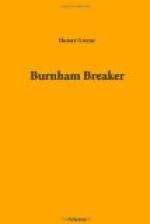Bachelor Billy put his arm around the boy and drew him to his side. He smoothed back the tangled hair from the child’s hot forehead and spoke rude words of comfort into his ears, and after a time Ralph grew quiet.
“Do you think, Uncle Billy,” asked Ralph, “‘at Rhymin’ Joe was a-tellin’ the truth? He used to lie, I know he did, I’ve heard ’im lie myself.”
“It looks verra like, Ralph, as though he might ‘a’ been a-tellin’ o’ the truth; he must ‘a’ been knowin’ to it all, or he could na tell it so plain.”
“Oh! he was; he knew all about it. I remember him about the first thing. He was there most all the time. But I didn’t know but he might just ‘a’ been lyin’ to get that money.”
“It’s no’ unlikely. But atween the twa, I’d sooner think it was the auld mon was a-tellin’ o’ the lee. He has more to make out o’ it, do ye see?”
“Well, there’s the evidence in court.”
“True, but Lawyer Sharpman kens the worth o’ that as well as ony o’ us. An he was na fearfu’ that the truth would owerbalance it, he wadna gi’ a mon a hunderd an’ fifty dollars to hold his tongue. I’m doubtfu’ for ye, Ralph, I’m verra doubtfu’.”
Ralph had believed Rhyming Joe’s story from the beginning, but he felt that this belief must be confirmed by Uncle Billy in order to put it beyond question. Now he was satisfied. It only remained to act.
“It’s all true,” he said; “I know it’s all true, an’ sumpthin’s got to be done. What shall I do, Uncle Billy?”
The troubled look deepened on the man’s face.
“Whether it’s fause or true,” he replied, “ye s’ould na keep it to yoursel’. She ought to know. It’s only fair to go an’ tell the tale to her an’ let her do what she thenks bes’.”
“Must I tell Mrs. Burnham? Must I go an’ tell her ’at I ain’t her son, an’ ‘at I can’t live with her, an’ ’at we can’t never be happy together the way we talked? Oh, Uncle Billy, I can’t do that, I can’t!”
He looked up beseechingly into the man’s face. Something that he saw there—pain, disappointment, affection, something, inspired him with fresh courage, and he started to his feet and dashed the tears from his eyes.
“Yes, I can do it too!” he exclaimed. “I can do anything ’at’s right, an’ that’s right. I won’t wait; I’ll go now.”
“Don’t haste, lad; wait a bit; listen! If the lady should be gone to court ye mus’ gae there too. If ye canna find her, ye mus’ find her lawyer. One or the ither ye s’ould tell, afoor the verdict comes; afterwards it might be too late.”
“Yes, I’ll do it, I’ll do it just like that.”
“Mos’ like ye’ll have to go to Wilkesbarre. An ye do I’ll go mysel’. But dinna wait for me. I’ll coom when I can get awa’. Ye s’ould go on the first train that leaves.”
“Yes, I unnerstan’. I’ll go now.”




